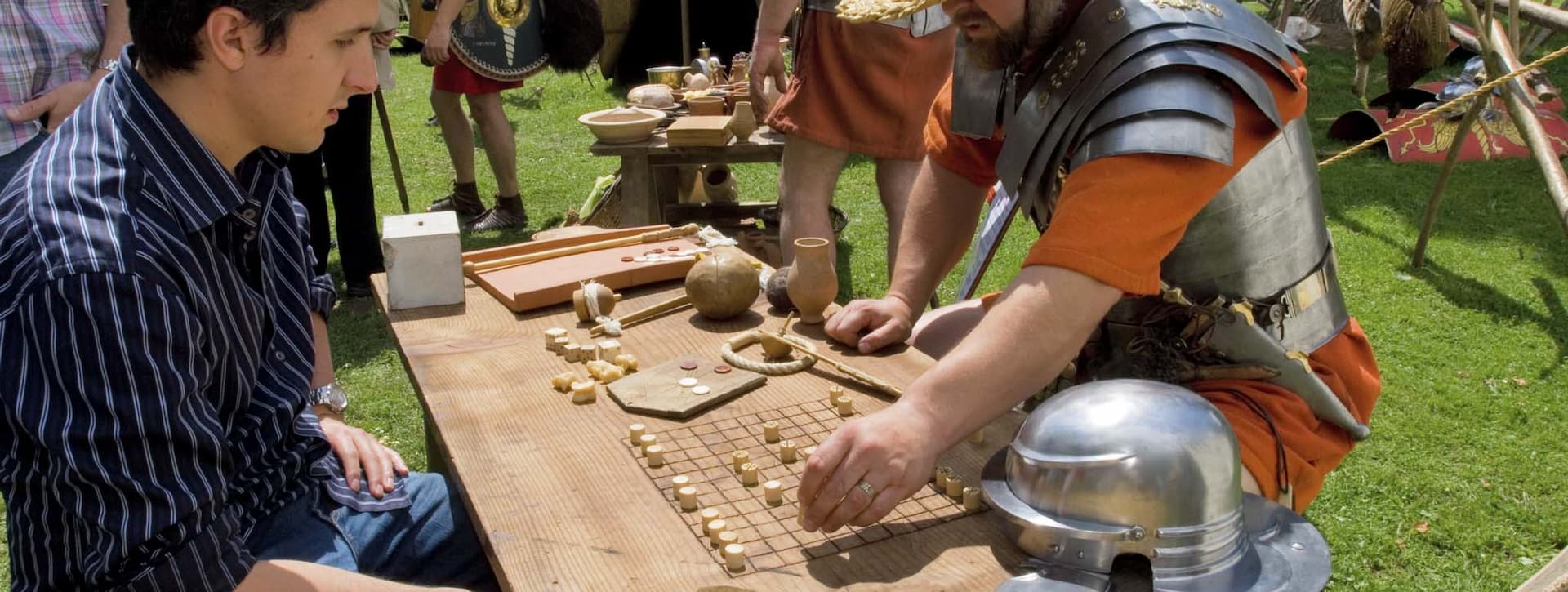Playhouse
Discovered. Played.
Romans of all ages loved to play. Dice games, mill and games of skill were very popular. Simple stones or pieces of glass were used as game pieces. There were also wooden spinning tops, dolls and clay figures. Small sheep bones were used as dice for games or for oracle divination. Gambling was only permitted on a few days of the year, but even Emperor Augustus is said to have been a passionate gambler. The joy of playing connects us across millennia and shows that playing is timeless!
Game instructions
Mill (Mola)
2 players with 9 pieces each
Roll the dice to decide who goes first. Take turns placing one piece at a time on a free intersection or corner on the board. Once you have placed all your pieces, you can start taking turns moving them. You can only move your pieces to free intersections or corners and cannot jump over other pieces. Try to get three of your pieces in a straight row (not diagonally). This is called a mill. You can open and close a mill by moving a piece one space and then moving it back into the row of three the next turn. For each of these closed mills, you can remove any of your opponent's pieces from the board. As soon as a player has only three pieces left, they cannot only move their pieces but also put them onto free spaces. If you have fewer than three pieces left, you have lost.
Round Mill (Mola Rotuna)
2 players with 3 game pieces each
The aim of the game is to place three game pieces in a straight line across the center. Roll the dice to decide who goes first! Take turns placing a piece on an empty space. Once you have placed all your pieces, you can start moving them. However, you can only move your pieces to empty spaces and cannot jump over other pieces. The person who manages to place three pieces in a row across the center first wins Round Mill. However, this can only work if one of you makes a mistake.
Soldier game (Ludus Latrunculorum)
2 players with 16 game pieces each
Arrange your game pieces (soldiers) in two rows of 8 each. Decide who goes first. Each turn, you can move one of your pieces forward, backward, or sideways by one space. If an opponent's piece is on a diagonally adjacent space and there is a free space behind it, you can jump over it diagonally. It is then captured and removed from the board. If your piece can jump again after that, you can strike again in the same turn. You cannot capture in a straight line. The aim is to knock all of your opponent's pieces off the board or immobilize them.
Alternative: The traditional rules of the game are not clear. There is another way to play the game. In this version, you capture an opponent's piece by surrounding it with two of your own pieces horizontally or vertically, but not diagonally.
12-square game (Ludus XII Scriptorum)
2 players with 12 game pieces each, 2 dice
The game board has three rows. The middle row is only the starting square. The aim of the game is to move your pieces across all squares from 1 to 24. Roll the dice to decide who goes first. The person who wins rolls two dice. Then they can either move one piece forward by the total number of points rolled or move two different pieces by the separate numbers rolled. Then it is the other player's turn. If an opponent's piece is alone on a square, you may capture it. It must then be returned to the starting point. If two or more pieces of the same color are on a square, that square is blocked for the opposing player. This means that the pieces cannot be captured. However, the square can be skipped and is also counted. If you roll a double, i.e. two of the same numbers, you can roll again after your move. The first player to move all their pieces off the board beyond square 24 wins – even if the number rolled is higher than required.
Box of Archimedes (Loculus Archimedius)
Players: any number, can also be played alone
Try to make different figures out of the puzzle pieces. These could be dogs, elephants, geese, or even gladiators. You can also make up your own figures. It is important that you use all the puzzle pieces. The most beautiful, creative, or funniest figure wins! Alternatively, you can try to make a square out of all the puzzle pieces.
Orca
Any number of players (at least 2) with 5 throwing objects each and a vessel (Orca)
Stand at a distance from the vessel and determine the throwing distance. Take turns throwing with a steady hand—accuracy is more important than speed. The player who hits the target most often wins. A round ends when all throwing objects have been thrown. If you want to play several rounds, you can write down or remember your points to see who won at the end.


